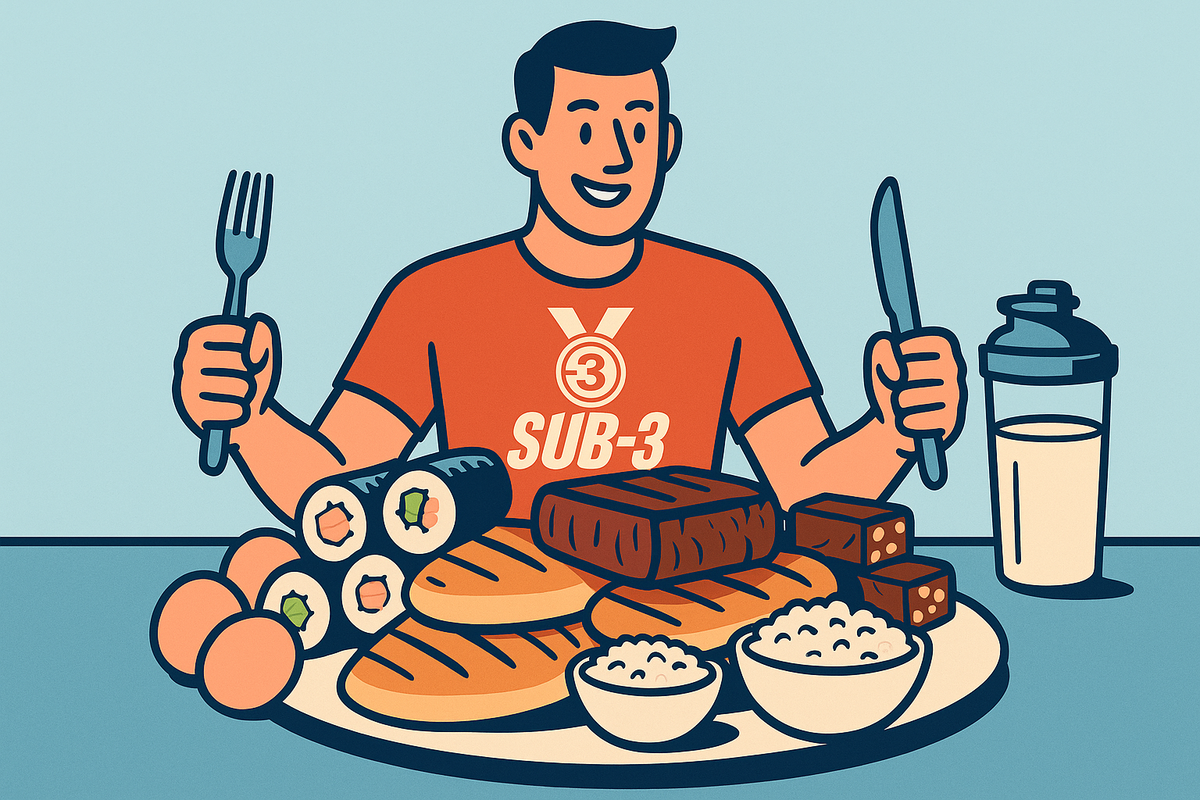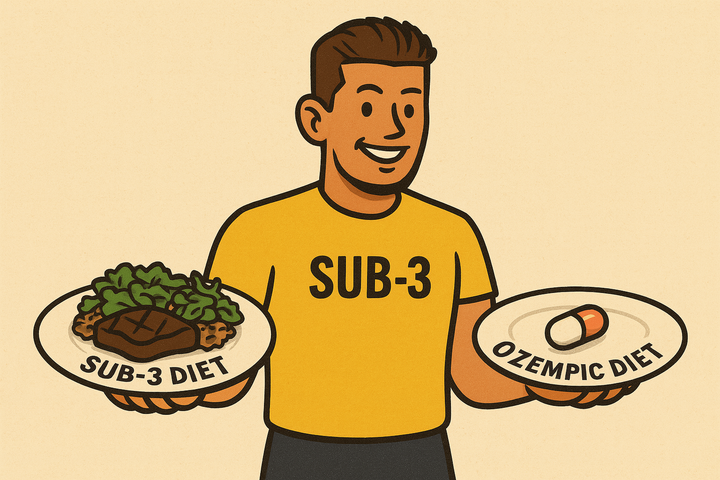How much protein should I be eating for a sub-3 effort?
If you're chasing sub-3, getting enough protein can help you bounce back faster, retain muscle, and train more effectively — without bulking up.

One of the most underrated weapons in a sub-3 marathoner's arsenal is protein. While carbohydrates steal the limelight in most endurance discussions, protein is quietly essential - not just for recovery, but for holding onto the gains your training delivers. When you’re running 100km or more a week, protein isn’t just for bodybuilders. It’s an essential ally in staying strong, lean, and consistent.
I currently eat around 1.6g of protein per kilo of bodyweight – so about 130g per day. Measured against lean body mass (around 69kg for me), that’s closer to 1.9g/kg. Either way, it’s within the 1.2–2.0g/kg range often recommended for endurance athletes, depending on intensity, training phase, and personal needs. It’s well above the standard dietary guidance for sedentary adults (0.8g/kg), but this isn’t a standard lifestyle. If you’re consistently pushing hard — tempo runs, long runs, intervals — your muscles are constantly breaking down and rebuilding. Protein is the raw material for that rebuild.
My intake typically comes in three tranches. After my main daily workout, I shake up a scoop of protein powder with skimmed milk (I use Bulk Pure Whey) and drink it within 20 minutes — two scoops after long runs. I prefer chocolate flavour, and find that milk adds not just protein, but a small hit of carbohydrate to help replenish glycogen. At dinner, I eat a high-protein main meal — often chicken, turkey, tuna, or salmon — and about an hour before bed I’ll have 20–30g of protein from a big tub of fat-free Skyr.
The changes I’ve noticed have been huge. I’d estimate my protein intake has increased by over 50% since I began tracking it, and I was genuinely shocked by how low it had been before. Timing matters too. Getting protein in soon after a workout, and again before bed, has helped me bounce back faster, feel less fatigued the next day, and hold onto muscle through training blocks. Many advisory books say most people get enough protein from their diet. But in my case, that wasn’t true — I was eating a very carb-heavy diet. And as I’ve learned the hard way: carbs can convert to fat if unused.
There’s no question in my mind that sufficient protein improves recovery and preserves muscle. That means not only getting back out there quicker, but also actually consolidating your gains. As a masters runner, I’ve become more focused on body composition, not just weight. The Garmin Index S2 smart scales have been a gamechanger for me — tracking fat and muscle mass daily via Garmin Connect. It’s easy to fixate on the number on the scale, and it can bounce about quite a lot, but I’ve found my weight can remain stable while my composition changes. Protein helps hold onto muscle and prevent the creeping “softness” that can come with age and high mileage.
For those unsure where to start, a quick reality check: eating 1.2–2g of protein per kilo is more than it sounds. For a 75kg runner, that’s 90–150g of protein a day — the equivalent of about 15–25 eggs, 3–5 chicken breasts, or 5–8 tubs of Skyr. That can feel daunting. But it’s entirely manageable with the right strategies. A scoop of good-quality whey protein delivers 20–25g in a flash. If you combine that with a high-protein evening meal and a Skyr or protein snack before bed, you’re most of the way there.
Personally, I’ve had the best results with Bulk Whey Protein — it’s high in protein, dissolves well in milk, and isn’t as cloying or clumpy as many others. It even tastes good whipped into Skyr or Greek yoghurt. On the go, I reach for Grenade Bars (Chocolate Mint and Dark Chocolate Raspberry are favourites), though they can be pricey. A recent favourite of mine is the Arla Protein Yoghurt Pouch, which you can squeeze like a gel - incredibly convenient, especially after a race or in a supermarket meal deal. They remind me of how I used to feed my son as a toddler, but they work - and they don’t spoil too badly out of the fridge for a few hours.
Of course, with mileage being high during a training block, it’s tempting to throw calorie-counting aside and eat whatever you like. I’ve done that plenty of times. But you’re putting in so much work to build aerobic strength and muscular resilience — you owe it to yourself to consolidate those gains. Just try a sense-check for a few days. Work in an extra 40–50g of protein through a shake or evening Skyr. It’s a low-risk, high-reward tweak. And no — you won’t bulk up like Arnie. Your legs need this protein for repair, not size.
Five things to know about protein and sub-3 marathon training
- Most sub-3 runners should aim for 1.2–2.0g of protein per kilo of bodyweight daily.
- Timing matters: get protein within 30 minutes post-run and before bed.
- Protein helps reduce muscle breakdown, speed up recovery, and retain lean mass.
- Whey powder and high-protein yoghurts make hitting targets much easier.
- Don’t fear “too much” — with your mileage, you’re far more likely to be under-eating than overdoing it.
Note: People with kidney disease should seek medical advice before high-protein diets.
Finding this useful? Help keep Sub-3 running — support us with a coffee.



